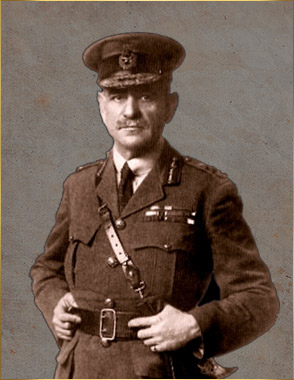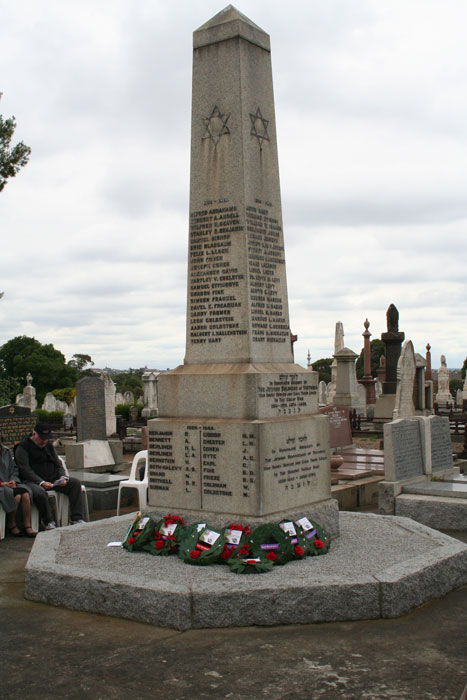Victorian Association of Jewish Ex & Servicemen & Women Australia Incorporated
Founding Member General Sir John Monash GCMG KCB VD
Glass MC
Surname
Glass MC
First names
Richard Lewis Barnet (Dick)
Rank
Lieutenant
Service No.
VX45395
Date of Death
31/05/2008
Hebrew Date
26 Iyyar 5768
Hebrew Date
כ״ו בְּאִיָּר תשס״ח
Age at Death
92
How Died
Where Died
Melbourne, Victoria, Australia
Cemetery
Springvale Botanical Cemetery (Necropolis), Victoria, Australia
Service Details
2/11 Field Regiment, Royal Australian Artillery
Served
New Guinea
Occupation
Statistician
Age at Enlistment
25
Place of Enlistment
Caulfield, Victoria
Locality on Enlistment
Toorak, Victoria
Religion
Jewish
Gender
Male
Date of Enlistment
12/7/1940
Date of Discharge
17/1/1946
Country of Enlistment
Australia
Notes
Born 25/6/1915 St Kilda, Victoria. 15/4/1947 awarded Military Cross. "During the Southern Bougainville campaign Lietenant Glass was acting as Forward Observation Officer with an infantry patrol from 'C' Company 47 Australian Infantry Battalion east of the Mivo River. At about 1315 hours on 24 July the patrol was ambushed and the forward scout killed. Although the enemy position was only sixty yards distant Lieutenant Glass brought down artillery fire. During the fire fight Lieutenant Glass was severely wounded in the left arm. Under persistent attack from the enemy for two and a half hours when the fighting was too close for artillery support, and while he was under almost continuous rifle, LMG and mortar fire he acted with great coolness and courage and engaged the enemy with his sub machine gun with one arm, accounting for two enemy killed. Although severely wounded this officer returned two miles on foot to the company area when the patrol was extricated, and refused medical attention until the other ten wounded of the patrol had been attended to. The bravery and devotion to duty of Lieutenant Glass in this patrol action undoubtedly saved heavier casualties." DICK Glass, who introduced new standards to the dry-cleaning industry when he restructured and led Brown Gouge during a 20-year term as general manager, died of heart disease at a nursing home in Brighton, aged 92. Glass, who came from and married into family stock that played prominent roles in Melbourne's commerce and development, in turn showed his own leadership skills on the battlefield and in business. He was the elder of two children born in St Kilda to Zara (nee Sanders) and Ernest Glass: the Sanders family had established the Leviathan Men's Store in Melbourne; his paternal grandfather Barnet Glass pioneered the rubber industry in Australia. Glass was sent to Wadhurst, Melbourne Grammar's preparatory school, where he encountered some anti-Semitism, so his mother arranged for him to be taught to box. He went on to Geelong Grammar, where the matron of his boarding house, Manifold, transformed him into a bridge player for life. At school, Glass, who inevitably was known as "Bottles", also had time to enjoy rowing, rugby and boxing, at which he was school champion. Leaving school, he joined the Barnet Glass company and in his spare time qualified as an accountant. In the mid-1930s he joined the militia (artillery), and after World War II began he enlisted in the Second AIF, and was posted to the 2nd/11th Field Regiment with the 8th Division. His unit fought the Vichy French in Syria, and Glass, a gun sergeant, was appointed sergeant major his CO overlooking the fact that he was short-sighted. When Japan entered the war, his unit returned to Australia and was assigned to Darwin, and his CO sent him to officer's training school. In 1942, Glass married Joan Appleton, whose family was associated with shipping, and after whom Appleton Dock was named. Returning to his unit, the regiment was posted to Bougainville, where Glass, now a lieutenant, earned a Military Cross on July 24, 1945, for gallantry while supporting a patrol of C Company of the 47th Battalion. He was the forward observer when the patrol was ambushed by a party of 60 Japanese. Despite having his left arm shattered by shrapnel, he continued to fire his Owen gun with his right hand. He also called down artillery fire on the enemy using close target procedure, which enabled the surviving members of the patrol to extricate themselves. Three men of the 24-man patrol were killed and 11 were wounded. Glass spent the next six months in hospital recovering from his wounds. After he was discharged from hospital and the army, Glass became a cost accountant with Australian Paper Mills. Later, his management skills led to the position of general manager of Brown Gouge Drycleaners. Having mastered early computers, Glass typed the manuscript for Observation Post, the official history of his wartime unit. Source: The Sydney Morning Herald

 John Monash (Monasch) born
in Melbourne, Australia on 27 June 1865, the son of
German Polish Jewish migrants, can be researched in any
military history encyclopaedia or in fact by just
‘Googling’ his name on the internet. His history
and list of achievements are long and far too many to detail
in this brief summary. However, might I say that reading his
history is well worth the effort and I can assure you that
his deeds will amaze you. I have found that the deeds are
better labelled on more than one man and in more than one
lifetime.
John Monash (Monasch) born
in Melbourne, Australia on 27 June 1865, the son of
German Polish Jewish migrants, can be researched in any
military history encyclopaedia or in fact by just
‘Googling’ his name on the internet. His history
and list of achievements are long and far too many to detail
in this brief summary. However, might I say that reading his
history is well worth the effort and I can assure you that
his deeds will amaze you. I have found that the deeds are
better labelled on more than one man and in more than one
lifetime. An
announcement was made in the weeks leading up to the
Centenary of ANZAC by Judy Landau, President VAJEX Aust.
She stated that it gave her great delight to announce
that VAJEX Aust (Victorian Association of Jewish Ex
& Servicemen & Women Australia Inc) has
successfully raised the required funds to build a new
Victorian Jewish Memorial after the style of the
historic Memorial located in the Jewish section of the
Melbourne General Cemetery. After an extensive two year
process, Judy has single-handedly sought letters of
support, raised the funds, and obtained approval from
the City of Port Phillip.
An
announcement was made in the weeks leading up to the
Centenary of ANZAC by Judy Landau, President VAJEX Aust.
She stated that it gave her great delight to announce
that VAJEX Aust (Victorian Association of Jewish Ex
& Servicemen & Women Australia Inc) has
successfully raised the required funds to build a new
Victorian Jewish Memorial after the style of the
historic Memorial located in the Jewish section of the
Melbourne General Cemetery. After an extensive two year
process, Judy has single-handedly sought letters of
support, raised the funds, and obtained approval from
the City of Port Phillip.
